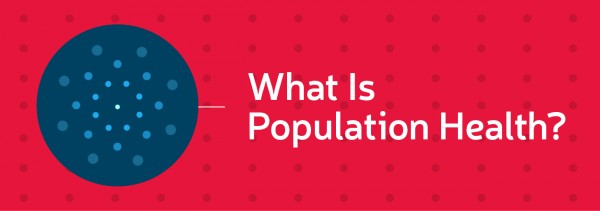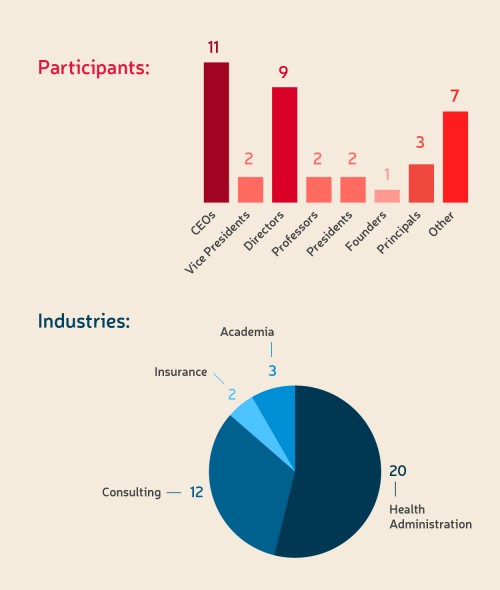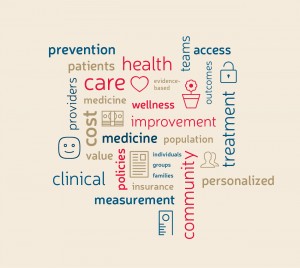What Is Population Health?

“Population health.” It is a term that is widely used in the health care world, but not universally understood. Some definitions of population health emphasize outcomes. Others focus on measurement. Still others emphasize accountability. So what does population health truly mean? Who is responsible? What impact does it have on our current health care environment?
In recognition that there is no uniform definition of this important and emergent concept, we sought out to create a new dialogue featuring a variety of thought leaders in the field. We reached out to over 100 health care leaders and asked them to define the term “population health.” What follows are their responses.
What We Learned
The concept of population health first came about in 2003 when David Kindig and Greg Stoddart defined it as “the health outcome of a group of individuals, including the distribution of such outcomes within the group.” While accurate, some complain this definition focuses strictly on the measurement of health outcomes without explaining or acknowledging the role that health care providers must take to impact those outcomes.

Our survey reflected that notion. Of the 37 leaders who participated, only two people directly cited Kingdig and Stoddard’s original definition. While interpretation and understanding of the phrase “population health” differed greatly in the responses we received, many did view it as an opportunity for health care systems, agencies and organizations to work together in order to improve the health outcomes of the communities they serve. Two other key trends and questions we observed include:
- A question of responsibility. Do the health outcomes of a specific population rely on the behaviors of the population? The actions of the provider? Or both?
- A take on Triple Aim. Several participants referenced the Triple Aim Initiative, an approach developed by the Institute for Healthcare Improvement for optimizing health system performance.
What’s Next

While we may not have reached a universal consensus on what “population health” means, we discovered that now is the time to think differently — not only about the definition of population health — but also about the way health care is delivered. In our ever-evolving health care environment, perhaps the “traditional way” may not be the right answer.
We welcome discussion regarding the ideas we present here and look forward to creating an ongoing, open dialogue about the role population health plays in the health care industry today.
Participants
- Wayne Brackin, Chief Operating Officer and Executive Vice President, Baptist Health South Florida
- Paul Brashnyk, MPH, Interim Director of Clinic Operations, UW Neighborhood Clinics
- Fred L. Brown, LFACHE, Chairman, Fred L. Brown & Associates, LLC
- Brian Churchill, Director of Clinical Content and Decision Support, PeaceHealth
- Todd M. Cohen, Director, AtSite Inc.
- Dr. Kenneth Cohn, CEO, Healthcare Collaboration
- Dr. Dennis R. Delisle, Director of Operations and Support, Thomas Jefferson University Hospitals
- Gigi DeSouki, MHA, Founder/CEO, Wellness On Wheels, Inc.
- Jack Friedman, CEO, Providence Health Plan
- Richard J. Gilfillan, MD, President and CEO, Trinity Health
- Jim Goes, Managing Partner, Cybernos LLC
- David Harlow, Principal (Attorney & Consultant), The Harlow Group LLC
- Jay Henry, Chairman & CEO, The James Marshall Group
- Dr. Patrick Herson, President, Fairview Medical Group
- Jay Higgins, Senior Director of Network Strategy and Surgical Program Development, Brigham and Women’s Hospital
- Ryan Jensen, CEO, The Memorial Hospital of Salem County
- Tammie Jones, Senior Health Policy Officer, US Army Office of The Surgeon General
- Dr. Christy Harris Lemak, Professor and Chair, the Health Services Administration Department at the University of Alabama at Birmingham
- Dr. Stephen Martin, Executive Director, Association for Community Health Improvement
- Dr. Larry Mullins, President and CEO, Samaritan Health Services
- Roy J. Orr, Director of Business Development and Supply Chain Services, Salem Health
- Joseph Paduda, Principal, Health Strategy Associates
- Bonnie Panlasigui, Chief Administrative Officer, Alameda Hospital
- David C. Pate, MD, JD, President and CEO, St. Luke’s Health System
- Janet Porter, Principal, Stroudwater Associates
- Barry Ronan, President & CEO, Western Maryland Health System
- David Rubenstein, FACHE, Clinical Associate Professor, Texas State University
- Kathryn Ruscitto, CEO, St. Joseph’s Hospital Health Center
- Marie Savard, MD, Managing Director of Health Care Practice, Diversified Search
- Dr. Nancy Seifert, Instructor, Oregon State University
- Dr. Peter Slavin, President, Massachusetts General Hospital
- Mari K. Stout, MHSA, Quality Improvement/Provider Engagement Specialist, ATRIO Health Plans
- Amy Stowers, CEO, OptimizeIT Consulting
- Quint Studer, Founder, Studer Group
- Bahaa Wanly, Administrator, UW Medicine
- Jennifer Weiss Wilkerson, Vice President, MedStar Health
- Dr. Stephanie Works, Senior Medical Director, Providence Medical Group
onlinepublichealth.gwu.edu/what-is-population-health/#Cohn(opens in a new tab)
Wayne Brackin
Chief Operating Officer and Executive Vice President, Baptist Health South Florida
“My definition is practical. You need to define the population and decide what it is you’re going to manage and what doctors are needed. To be more specific, let me give you an example. A partnership was created with Florida International University College of Medicine and Baptist Health South Florida/South Miami Hospital to care for 100 disadvantaged families in a defined neighborhood adjacent to the hospital. It is a defined population, there are identifiable needs that can be measured and a combination of providers from the medical school and the hospital will manage the families. That is a working definition of population health management.”
Paul Brashnyk, MPH
Interim Director of Clinic Operations, UW Neighborhood Clinics
“Population health is taking responsibility for managing the overall health of a defined population and being accountable for the health outcomes of that defined population.”
Fred L. Brown, LFACHE
Chairman, Fred L. Brown & Associates, LLC
“Population health is improving the health of a defined population.”
Brian Churchill
Director of Clinical Content and Decision Support, PeaceHealth
“The goal of population health is to improve the quality of care and outcomes while managing costs for a defined group of people. The defined group of people and the health management interventions can be identified by demographic differences, health needs such as chronic diseases or disabilities, or the health needs of the underserved.”
Todd M. Cohen
Director, AtSite Inc.
“Population health signals a change in the way health care is accessed, provided and utilized — a move away from reactive responses to an individual’s health needs. The concept marks a fundamental shift towards outcomes-based, proactive approaches to a given population with attention directed toward larger, socially grouped needs and prevention efforts while reducing disparity and variation in care delivery.”
Dr. Kenneth Cohn
CEO, Healthcare Collaboration
“To me, population health involves the health of the community; it implies wellness promotion as well as the treatment of new and chronic illnesses throughout the care continuum. It also implies improving the health of people previously undermanaged, such as the poor in terms of conditions such as diabetes, hypertension and cancer.”
Dr. Dennis R. Delisle
Director of Operations and Support, Thomas Jefferson University Hospitals
“Accountability for the health and utilization of health care services of a defined population of individuals across the care continuum, from preventative to acute to post-acute settings.”
Gigi DeSouki, MHA
Founder/CEO, Wellness On Wheels, Inc.
“Individual responsibility for physical, mental, spiritual and social health. When each person takes control of his or her health, it reflects on our families and society as a whole.”
Jack Friedman
CEO, Providence Health Plan
“Population health is the acknowledgement that the goal of all health system stakeholders is to do the most good for the most people at the least amount of cost. It requires a primary care centered model that incentivizes all providers to measure their clinical performance at the population level, and it requires interface between public and private institutions along with local community engagement. Population longevity and broad values around quality of life are the ultimate measures of success and performance.”
Richard J. Gilfillan, MD
President and CEO, Trinity Health
“Population health refers to addressing the health status of a defined population. A population can be defined in many different ways including demographics, clinical diagnoses, geographic location, etc. Population health management is a clinical discipline that develops, implements and continually refines operational activities that improve the measures of health status for defined populations. At Trinity Health, we measure the health status of a population using the Triple Aim of better health, better care and lower costs.”
Jim Goes
Managing Partner, Cybernos LLC
“I think of population health as an approach to develop research that addresses the needs of both the overall population of a state, country or region and the health of important sub-populations that can be differentiated by ethnicity, gender, health status or even economic status.”
David Harlow
Principal (Attorney & Consultant), The Harlow Group LLC
“’Population health’ is both a means and an end. The goal is to improve the collective health status of the population at large in a given geographic area. That goal can only be accomplished through a combination of (1) behavior change, which has to be promoted in a tailored manner, using an array of appropriate tools — not only through traditional health care channels — to different subsets of the population (chronically-ill elders, new moms, engaged patients, millenials, baby-boomer weekend warriors, etc.), and (2) evidence-based medicine focused both on prevention and treatment of injury and disease and on improving function and happiness for the individuals who make up the population.”
Jay Henry
Chairman & CEO, The James Marshall Group
“The overall mental and physical state of health for a defined group of people.”
Dr. Patrick Herson
President, Fairview Medical Group
“Population health is an approach to improving outcomes of a defined population. We have defined outcomes as the Triple Aim — cost, quality and experience.”
Jay Higgins
Senior Director of Network Strategy and Surgical Program Development, Brigham and Women’s Hospital
“Population health is keeping people healthy in a coordinated fashion for better clinical outcomes at a lower cost. It is a ‘proactive’ solution (with personalized care and a focus on wellness) in an industry that has thrived on being ‘reactive’ (delays in treatment resulting in sicker patients, ordering unnecessary tests and sending patients to emergency departments due to primary care access challenges).”
Ryan Jensen
CEO, The Memorial Hospital of Salem County
“Population health signifies the movement from a silo-focused delivery of medicine to a communal effort with the purpose of improving the overall health outcomes of a population.”
Tammie Jones
Senior Health Policy Officer, US Army Office of The Surgeon General
“Population health is a visionary statement that gives a sense of what we want for our population. A health status that allows individuals in our communities to serve one another to their greatest ability.”
Dr. Christy Harris Lemak
Professor and Chair, the Health Services Administration Department at the University of Alabama at Birmingham
“Understanding (measuring) the health of a defined population (community, covered life population, set of patients) to include all aspects of health (physical, mental, etc.) and to include the underlying determinants of that health (e.g., poverty, housing, nutrition, exercise, pollution) and, most importantly, working to improve the health of that population.”
Dr. Stephen Martin
Executive Director, Association for Community Health Improvement
“Population health is the health outcomes of a defined group of people, including the distribution of such outcomes within the group (Kindig et al).”
Dr. Larry Mullins
President and CEO, Samaritan Health Services
“Some would define it as determining the health of a defined group or population using health care modifiers to help make that determination. An easier answer might be just taking care of our family, friends and neighbors on a larger scale.”
Roy J. Orr
Director of Business Development and Supply Chain Services, Salem Health
“Population health is the health status or outcome of a group of people. The distribution of various conditions throughout the group allows for an improved understanding of a particular population’s health.”
Joseph Paduda
Principal, Health Strategy Associates
“A measure of and policies affecting the overall well-being of the residents of a defined area.”
Bonnie Panlasigui
Chief Administrative Officer, Alameda Hospital
“We are entering a population tsunami. For example, California will be one of the first ‘minority majority’ states in the country. How we respond to diversity in the population is key … the social inequities are the social determinants of health that impact pre-hospital chronic disease management, post-hospital surgery outcomes and readmissions — all factors that have an operational impact on a hospital.”
David C. Pate, MD, JD
President and CEO, St. Luke’s Health System
“Population health encompasses the programs, services, tactics and initiatives that a population health manager (e.g., a health system or an accountable care organization) utilizes in order to assume the accountability for the outcomes of care and the cost of that care for an entire population or subpopulation of people, only some of whom may currently be patients.”
Janet Porter
Principal, Stroudwater Associates
“Population health is the analysis and design of interventions and management of large groups of citizens focused on improving their health status.”
Barry Ronan
President & CEO, Western Maryland Health System
“Population health involves transitioning care delivery to a model that is value based which includes focusing on better case management of those patients with multiple co-morbidities, partnering in care delivery with other providers, including previous competitors, better managing overall utilization and caring for patients in the most appropriate setting, not necessarily acute care.”
David Rubenstein, FACHE
Clinical Associate Professor, Texas State University
“I’m comfortable with the Institute of Medicine (IOM) definition which describes population health as ‘the health outcomes of a group of individuals, including the distribution of such outcomes within the group (Kindig and Stoddart, 2003).’”
Kathryn Ruscitto
CEO, Joseph’s Hospital Health Center
“Population health means taking an analytical approach to understanding the health needs, disparities and outcomes of the community and to align improvement initiatives.”
Marie Savard, MD
Managing Director of Health Care Practice, Diversified Search
“Assuming total health and health care responsibility for a group of individuals and empowering them with health information and tools with an emphasis on personalized prevention and self-management programs. From my experience, it is managing care for the right reasons and improved health of the patient versus for economic reasons alone, which was the primary motivation of past attempts in population health.”
Dr. Nancy Seifert
Instructor, Oregon State University
“Population health is the collaborative efforts among all health care professionals within a population that measures patient outcomes, builds on best practices and monitors access.”
Dr. Peter Slavin
President, Massachusetts General Hospital
“Population health is a management approach to redesigning the care for a group of people with the aims of making their care better and more efficient.”
Mari K. Stout, MHSA
Quality Improvement/Provider Engagement Specialist, ATRIO Health Plans
“Population health: Managing the system of activities focused on improving health outcomes for a collection of individuals (a population) by identifying care gaps based on evidence-based guidelines, understanding barriers and developing systems/teams that can help make the right thing the easy thing for individual patients and providers.”
Amy Stowers
CEO, OptimizeIT Consulting
“Any definition of population health is evolving and thought provoking, in the most serious context possible, because every human as a member of the global population deserves the right to the foundational elements necessary to be healthy. Foundational elements are both basic and unique to populations; therefore, it is essential for the elements to be identified and provided in an unrelenting manner that mitigates any negative impact to the health of populations.”
Quint Studer
Founder, Studer Group
“I prefer to use the term ‘people health,’ meaning each individual should be as healthy as possible.”
Bahaa Wanly
Administrator, UW Medicine
“Effectively taking responsibility for the health care of populations of patients to ensure high-quality, efficient health care at the lowest possible cost for the population.”
Jennifer Weiss Wilkerson
Vice President, MedStar Health
“Population health is an approach to managing the health of a population — a community, a group of employees, insurance plan enrollees, etc. — in order to improve the health outcomes of each member of that population. Population health is also about providing value — the highest possible outcome at the lowest possible cost.”
Dr. Stephanie Works
Senior Medical Director, Providence Medical Group
“Population health is a concept placing emphasis on addressing multiple health determinants for a group of individuals, such that the overall health of the group improves.”


